外研版(2019)选择性必修 第四册 Unit 1 Looking forwards Developing ideas Reading课件(共31张)
文档属性
| 名称 | 外研版(2019)选择性必修 第四册 Unit 1 Looking forwards Developing ideas Reading课件(共31张) | 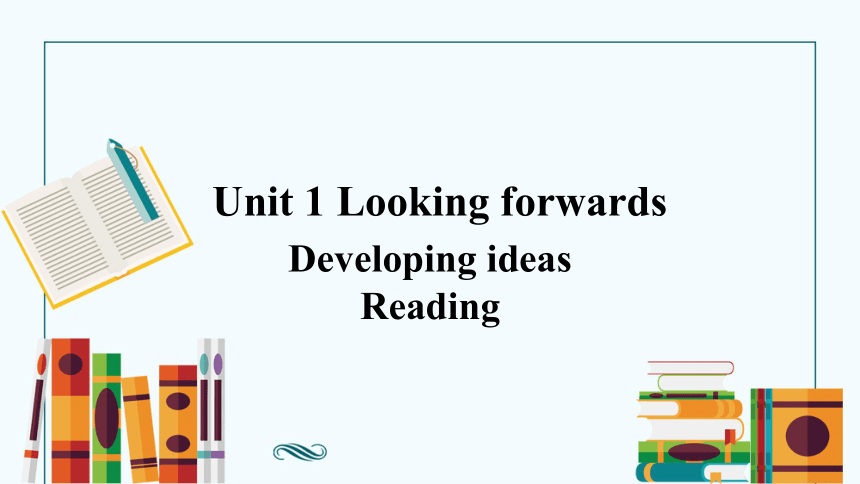 | |
| 格式 | pptx | ||
| 文件大小 | 1.2MB | ||
| 资源类型 | 教案 | ||
| 版本资源 | 外研版(2019) | ||
| 科目 | 英语 | ||
| 更新时间 | 2025-05-02 19:57:09 | ||
图片预览

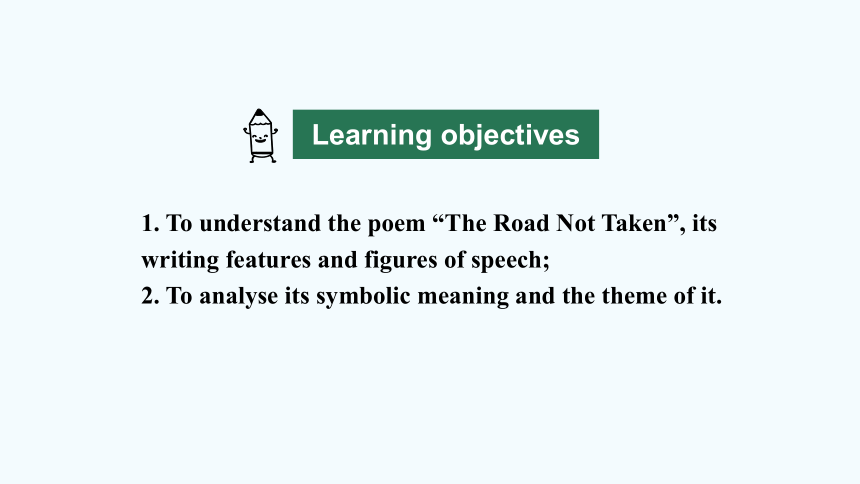
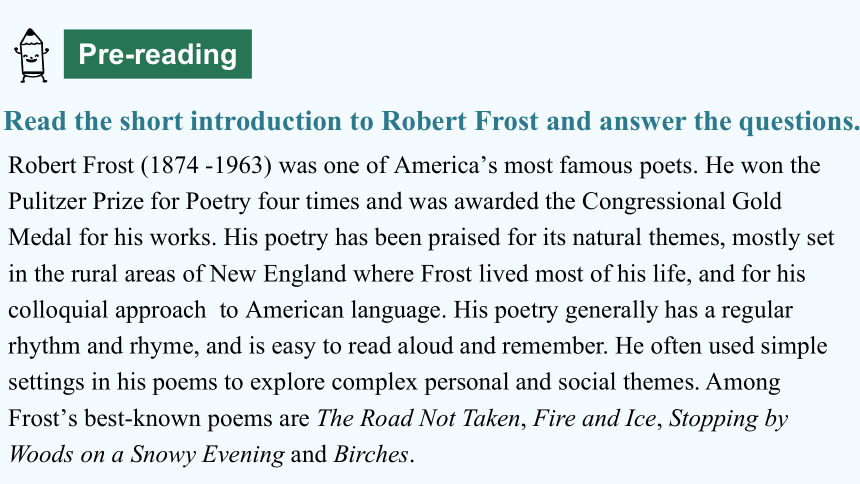
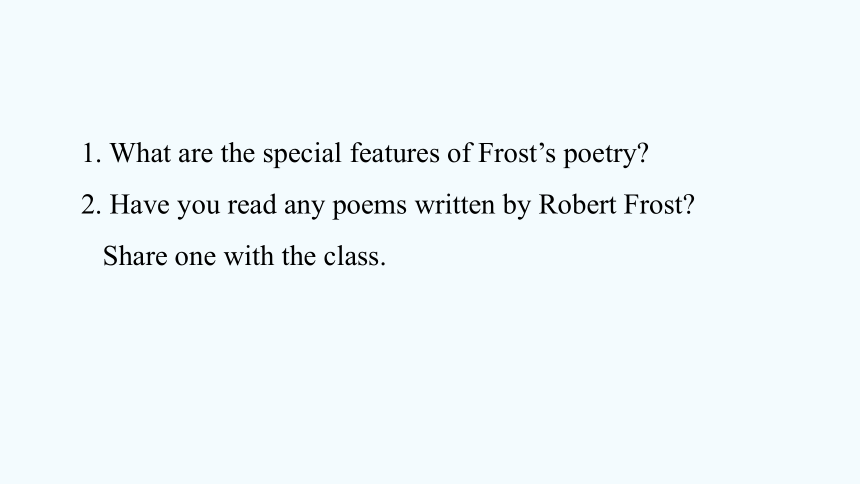
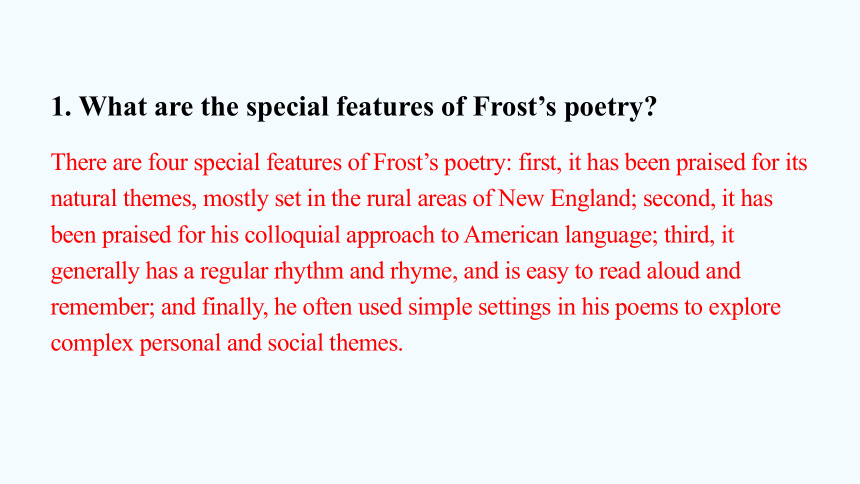
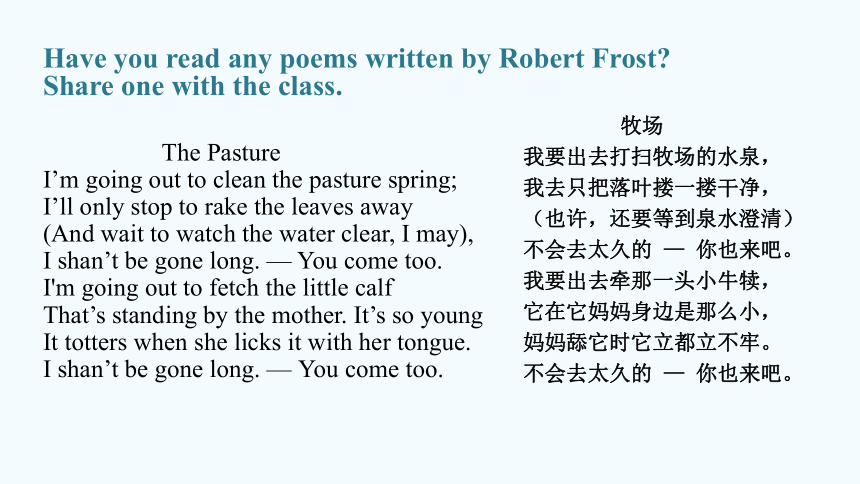
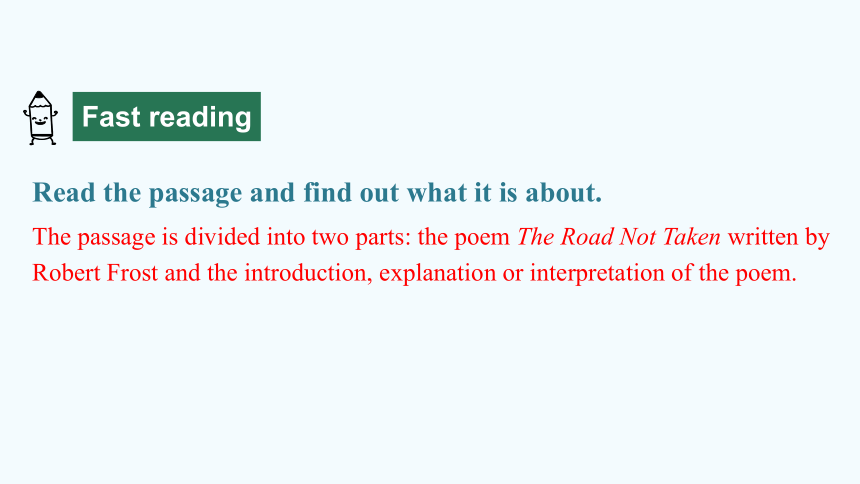
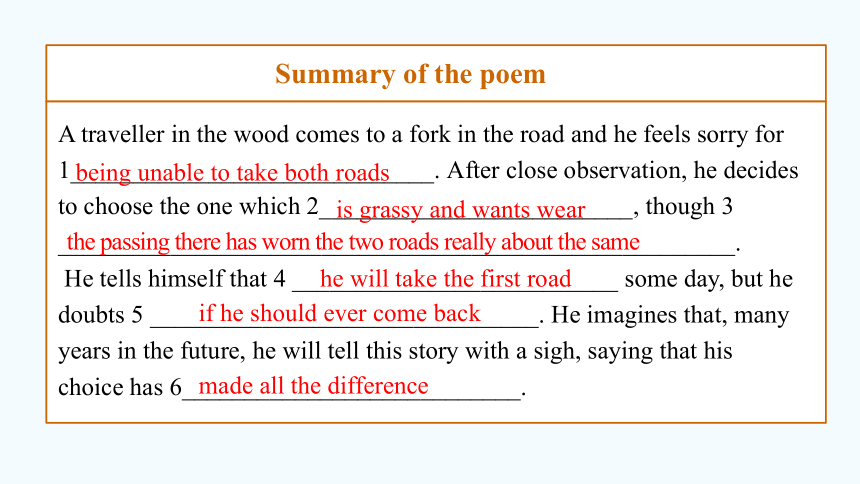
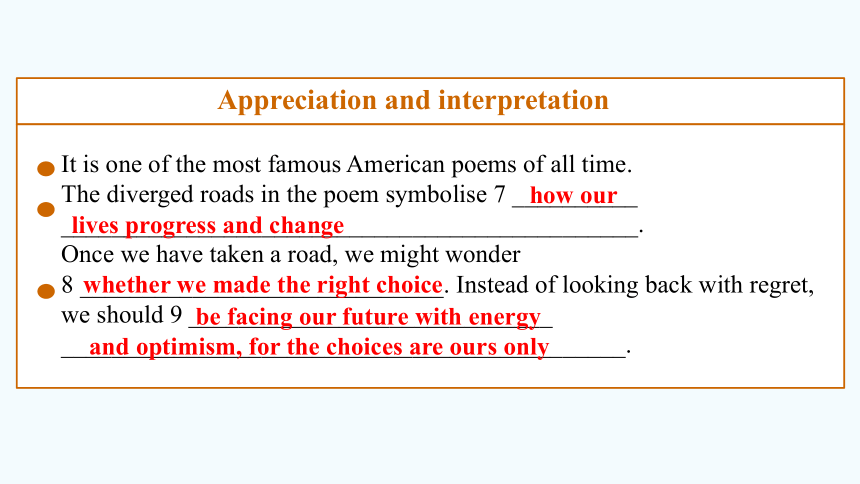
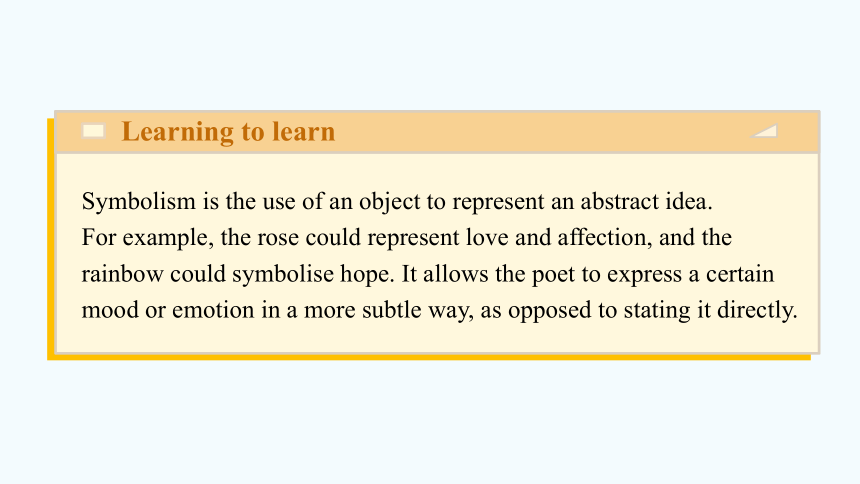
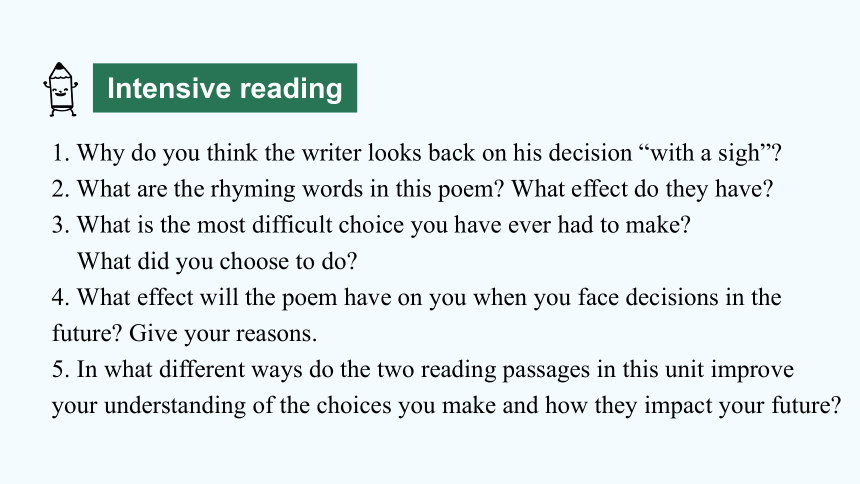
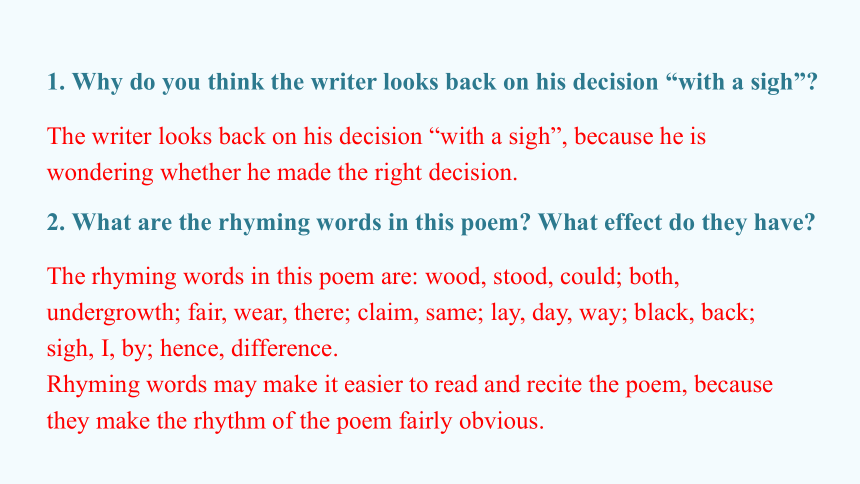
文档简介
(共31张PPT)
Developing ideas
Reading
Unit 1 Looking forwards
Learning objectives
1. To understand the poem “The Road Not Taken”, its writing features and figures of speech;
2. To analyse its symbolic meaning and the theme of it.
Read the short introduction to Robert Frost and answer the questions.
Robert Frost (1874 -1963) was one of America’s most famous poets. He won the Pulitzer Prize for Poetry four times and was awarded the Congressional Gold Medal for his works. His poetry has been praised for its natural themes, mostly set in the rural areas of New England where Frost lived most of his life, and for his colloquial approach to American language. His poetry generally has a regular rhythm and rhyme, and is easy to read aloud and remember. He often used simple settings in his poems to explore complex personal and social themes. Among Frost’s best-known poems are The Road Not Taken, Fire and Ice, Stopping by Woods on a Snowy Evening and Birches.
Pre-reading
1. What are the special features of Frost’s poetry
2. Have you read any poems written by Robert Frost
Share one with the class.
1. What are the special features of Frost’s poetry
There are four special features of Frost’s poetry: first, it has been praised for its natural themes, mostly set in the rural areas of New England; second, it has been praised for his colloquial approach to American language; third, it generally has a regular rhythm and rhyme, and is easy to read aloud and remember; and finally, he often used simple settings in his poems to explore complex personal and social themes.
The Pasture
I’m going out to clean the pasture spring;
I’ll only stop to rake the leaves away
(And wait to watch the water clear, I may),
I shan’t be gone long. — You come too.
I'm going out to fetch the little calf
That’s standing by the mother. It’s so young
It totters when she licks it with her tongue.
I shan’t be gone long. — You come too.
Have you read any poems written by Robert Frost Share one with the class.
牧场
我要出去打扫牧场的水泉,
我去只把落叶搂一搂干净,
(也许,还要等到泉水澄清)
不会去太久的 — 你也来吧。
我要出去牵那一头小牛犊,
它在它妈妈身边是那么小,
妈妈舔它时它立都立不牢。
不会去太久的 — 你也来吧。
The passage is divided into two parts: the poem The Road Not Taken written by Robert Frost and the introduction, explanation or interpretation of the poem.
Read the passage and find out what it is about.
Fast reading
Summary of the poem
A traveller in the wood comes to a fork in the road and he feels sorry for 1_____________________________. After close observation, he decides to choose the one which 2_________________________, though 3 ______________________________________________________.
He tells himself that 4 __________________________ some day, but he doubts 5 _______________________________. He imagines that, many years in the future, he will tell this story with a sigh, saying that his choice has 6___________________________.
being unable to take both roads
is grassy and wants wear
the passing there has worn the two roads really about the same
he will take the first road
if he should ever come back
made all the difference
Appreciation and interpretation
It is one of the most famous American poems of all time.
The diverged roads in the poem symbolise 7 __________
______________________________________________.
Once we have taken a road, we might wonder
8 _____________________________. Instead of looking back with regret, we should 9 _____________________________
_____________________________________________.
how our lives progress and change
whether we made the right choice
be facing our future with energy
and optimism, for the choices are ours only
Symbolism is the use of an object to represent an abstract idea.
For example, the rose could represent love and affection, and the rainbow could symbolise hope. It allows the poet to express a certain mood or emotion in a more subtle way, as opposed to stating it directly.
Learning to learn
1. Why do you think the writer looks back on his decision “with a sigh”
2. What are the rhyming words in this poem What effect do they have
3. What is the most difficult choice you have ever had to make
What did you choose to do
4. What effect will the poem have on you when you face decisions in the future Give your reasons.
5. In what different ways do the two reading passages in this unit improve your understanding of the choices you make and how they impact your future
Intensive reading
1. Why do you think the writer looks back on his decision “with a sigh”
The writer looks back on his decision “with a sigh”, because he is wondering whether he made the right decision.
2. What are the rhyming words in this poem What effect do they have
The rhyming words in this poem are: wood, stood, could; both, undergrowth; fair, wear, there; claim, same; lay, day, way; black, back; sigh, I, by; hence, difference.
Rhyming words may make it easier to read and recite the poem, because they make the rhythm of the poem fairly obvious.
3. What is the most difficult choice you have ever had to make What did you choose to do
One possible answer:
Once I had to make a difficult decision between lying to my mother to avoid being punished and telling the truth.
I chose to tell the truth because I’d like to be an honest person.
4. What effect will the poem have on you when you face decisions in the future Give your reasons.
One possible answer:
From the poem I know, whatever decisions I have made, I should make the most of the decision and be optimistic about the future rather than look back with regret.
5. In what different ways do the two reading passages in this unit improve your understanding of the choices you make and how they impact your future
One possible answer:
The first reading passage tells us that there are various possibilities for future development. And the second reading passage encourages us to face our future with energy and optimism instead of regret.
Work in groups. Read another interpretation of the poem and prepare a report comparing it with the one in the passage.
The Road Not Taken is one of America’s best-loved poems, and I think it is a pity that it is generally misunderstood as a call for facing the future without regret. To me, it is really about accepting the consequences of our choices many years in the future, when it is too late to change them. The two roads in the wood were “really about the same”, so the cause of any indecision is a fear of regret. It is, however, acceptable to feel regretful, because it serves as a reminder to live life to the full.
Post-reading
1. Discuss the two interpretations from the following aspects.
Do further research if necessary.
What points do the two interpretations share
What are the major differences between the two interpretations
Which interpretation seems more convincing to you Why
Can you think of yet another interpretation of the poem
What points do the two interpretations share
The two interpretations share the following points: the poem The Road Not Taken is one of America’s most famous or best-loved poems, and it is about choice.
What are the major differences between the two interpretations
The major differences between the two interpretations are: the one in the passage interprets the poem as a call for facing the future without regret, while the second interpretation (Robert’s) maintains that the poem is really about accepting the consequences of our choices many years in the future, when it is too late to change them.
Which interpretation seems more convincing to you Why
One possible answer:
The first interpretation seems more convincing to me because many people among us will fall into regret when we doubt whether we have made the right decision. We should be facing our future with energy and optimism.
Can you think of yet another interpretation of the poem
Show us your own answers!
3. Share your report with the class.
2. Prepare your report, including your understanding of the poem.
Now talk about how well your group completed the report and how others’ opinions have helped you better understand the poem.
1. progress v. ① 进步;进展;发展;改进
He will visit once a fortnight to see how his new staff are progressing.
他会每两个星期来访一次,看看他的新员工进展如何。
② 继续进行;逐步发展
As the evening progressed, sadness turned to rage.
随着夜幕逐渐降临,悲伤变成了愤怒。
progress n. 进步;进展
The medical community continues to make progress in the fight against cancer.
医学界在抗癌的斗争中不断取得进步。
Language points
2. claim v. ① 宣称;声称;断言
Scientists are claiming a major breakthrough in the fight against cancer.
科学家们宣称攻克癌症已有重大的突破。
② 要求(拥有);索取;认领
A lot of lost property is never claimed.
许多丢失的物品从未被认领。
claim n. 声称;断言
He repeated his claim that the people here backed his action.
他再次声称,这里的人民支持他的行动。
1. a number of _________________
2. insight into _________________
3. in fact _________________
4. on a daily basis _________________
5. range from ... to __________________
6. arise from __________________
许多;大量
深刻理解;洞察……
事实上
由……引起;起因于
(范围)从……到……
每天
7. result in ________________
8. lead to ________________
9. turn down ________________
10. a mixture of ________________
11. look back on ________________
12. make the most of ________________
拒绝
……的结合 / 混合物
导致;结果是
尽量利用;充分利用
回顾;回忆
导致;通向
1. When reading The Road Not Taken, one cannot help but see in one’s mind images of a peaceful wood deep within the countryside.
Paraphrase: When you read The Road Not Taken, it is easy to imagine a peaceful wood deep within the countryside.
cannot help but do sth 意为“无法抑制做某事;禁不住做某事”。
例如:He is such an unselfish man. You cannot help but respect him.
他是这样一个无私的人。你不得不尊敬他。
2. Life throws many alternatives at us on a daily basis.
Paraphrase: In our daily life, we have many choices.
throw many alternatives at us 表示“给了我们很多选择”。其中,alternative 意为“可供选择的事物”。
例如:You can be paid either in cash weekly or by cheque monthly.
Those are the two alternatives.
你的工资可以按周以现金支取,或按月以支票支取。二者可选其一。
Life throws many alternatives at us on a daily basis.
句中的 on a daily basis 意为“每天”。
例如:
Such things are taking place all over the country on a daily basis.
这个国家每天都有这样的事情发生。
3. Whether big or small, what all our choices have in common is that they lead to specific consequences.
Paraphrase: Whether our choices are big or small, they all cause particular results.
have ... in common 意为“有相同的……”
例如:Close friends usually have lots in common.
亲密的朋友通常有很多相同之处。
Whether big or small, what all our choices have in common is
that they lead to specific consequences.
whether 引导让步状语从句。该句还是一个省略句,省略了主语和谓语。
what引导主语从句
that 引导表语从句
4. What if, in choosing one, we are unknowingly turning down other future opportunities
Paraphrase: What if we are turning down other future opportunities without being aware of it when we choose one from the two job offers
What if ... 意为“如果……会怎么样?”该句型通常用于提出建议,是一种主句省略了主干成分,只保留疑问词 What + if 引导的条件状语从句的常见句型。
例如:What if the train is late 要是火车晚点了怎么办?
5. Some of us do take a more unusual path through life, and while it may be a harder one to follow, it can also lead to new adventures and experiences.
Paraphrase: Some of us do take a more uncommon path through life, and although it may be a more difficult one to follow, it can also lead to new adventures and experiences.
while 意为“尽管,虽然”,多放在句首。
While I am willing to help, I do not have much time available.
尽管我愿意帮忙,但是我没有太多时间。
1. Search the Internet to find and read more poems written by Robert Frost.
2. Write down your interpretation of the poem and share with the class.
Homework
Developing ideas
Reading
Unit 1 Looking forwards
Learning objectives
1. To understand the poem “The Road Not Taken”, its writing features and figures of speech;
2. To analyse its symbolic meaning and the theme of it.
Read the short introduction to Robert Frost and answer the questions.
Robert Frost (1874 -1963) was one of America’s most famous poets. He won the Pulitzer Prize for Poetry four times and was awarded the Congressional Gold Medal for his works. His poetry has been praised for its natural themes, mostly set in the rural areas of New England where Frost lived most of his life, and for his colloquial approach to American language. His poetry generally has a regular rhythm and rhyme, and is easy to read aloud and remember. He often used simple settings in his poems to explore complex personal and social themes. Among Frost’s best-known poems are The Road Not Taken, Fire and Ice, Stopping by Woods on a Snowy Evening and Birches.
Pre-reading
1. What are the special features of Frost’s poetry
2. Have you read any poems written by Robert Frost
Share one with the class.
1. What are the special features of Frost’s poetry
There are four special features of Frost’s poetry: first, it has been praised for its natural themes, mostly set in the rural areas of New England; second, it has been praised for his colloquial approach to American language; third, it generally has a regular rhythm and rhyme, and is easy to read aloud and remember; and finally, he often used simple settings in his poems to explore complex personal and social themes.
The Pasture
I’m going out to clean the pasture spring;
I’ll only stop to rake the leaves away
(And wait to watch the water clear, I may),
I shan’t be gone long. — You come too.
I'm going out to fetch the little calf
That’s standing by the mother. It’s so young
It totters when she licks it with her tongue.
I shan’t be gone long. — You come too.
Have you read any poems written by Robert Frost Share one with the class.
牧场
我要出去打扫牧场的水泉,
我去只把落叶搂一搂干净,
(也许,还要等到泉水澄清)
不会去太久的 — 你也来吧。
我要出去牵那一头小牛犊,
它在它妈妈身边是那么小,
妈妈舔它时它立都立不牢。
不会去太久的 — 你也来吧。
The passage is divided into two parts: the poem The Road Not Taken written by Robert Frost and the introduction, explanation or interpretation of the poem.
Read the passage and find out what it is about.
Fast reading
Summary of the poem
A traveller in the wood comes to a fork in the road and he feels sorry for 1_____________________________. After close observation, he decides to choose the one which 2_________________________, though 3 ______________________________________________________.
He tells himself that 4 __________________________ some day, but he doubts 5 _______________________________. He imagines that, many years in the future, he will tell this story with a sigh, saying that his choice has 6___________________________.
being unable to take both roads
is grassy and wants wear
the passing there has worn the two roads really about the same
he will take the first road
if he should ever come back
made all the difference
Appreciation and interpretation
It is one of the most famous American poems of all time.
The diverged roads in the poem symbolise 7 __________
______________________________________________.
Once we have taken a road, we might wonder
8 _____________________________. Instead of looking back with regret, we should 9 _____________________________
_____________________________________________.
how our lives progress and change
whether we made the right choice
be facing our future with energy
and optimism, for the choices are ours only
Symbolism is the use of an object to represent an abstract idea.
For example, the rose could represent love and affection, and the rainbow could symbolise hope. It allows the poet to express a certain mood or emotion in a more subtle way, as opposed to stating it directly.
Learning to learn
1. Why do you think the writer looks back on his decision “with a sigh”
2. What are the rhyming words in this poem What effect do they have
3. What is the most difficult choice you have ever had to make
What did you choose to do
4. What effect will the poem have on you when you face decisions in the future Give your reasons.
5. In what different ways do the two reading passages in this unit improve your understanding of the choices you make and how they impact your future
Intensive reading
1. Why do you think the writer looks back on his decision “with a sigh”
The writer looks back on his decision “with a sigh”, because he is wondering whether he made the right decision.
2. What are the rhyming words in this poem What effect do they have
The rhyming words in this poem are: wood, stood, could; both, undergrowth; fair, wear, there; claim, same; lay, day, way; black, back; sigh, I, by; hence, difference.
Rhyming words may make it easier to read and recite the poem, because they make the rhythm of the poem fairly obvious.
3. What is the most difficult choice you have ever had to make What did you choose to do
One possible answer:
Once I had to make a difficult decision between lying to my mother to avoid being punished and telling the truth.
I chose to tell the truth because I’d like to be an honest person.
4. What effect will the poem have on you when you face decisions in the future Give your reasons.
One possible answer:
From the poem I know, whatever decisions I have made, I should make the most of the decision and be optimistic about the future rather than look back with regret.
5. In what different ways do the two reading passages in this unit improve your understanding of the choices you make and how they impact your future
One possible answer:
The first reading passage tells us that there are various possibilities for future development. And the second reading passage encourages us to face our future with energy and optimism instead of regret.
Work in groups. Read another interpretation of the poem and prepare a report comparing it with the one in the passage.
The Road Not Taken is one of America’s best-loved poems, and I think it is a pity that it is generally misunderstood as a call for facing the future without regret. To me, it is really about accepting the consequences of our choices many years in the future, when it is too late to change them. The two roads in the wood were “really about the same”, so the cause of any indecision is a fear of regret. It is, however, acceptable to feel regretful, because it serves as a reminder to live life to the full.
Post-reading
1. Discuss the two interpretations from the following aspects.
Do further research if necessary.
What points do the two interpretations share
What are the major differences between the two interpretations
Which interpretation seems more convincing to you Why
Can you think of yet another interpretation of the poem
What points do the two interpretations share
The two interpretations share the following points: the poem The Road Not Taken is one of America’s most famous or best-loved poems, and it is about choice.
What are the major differences between the two interpretations
The major differences between the two interpretations are: the one in the passage interprets the poem as a call for facing the future without regret, while the second interpretation (Robert’s) maintains that the poem is really about accepting the consequences of our choices many years in the future, when it is too late to change them.
Which interpretation seems more convincing to you Why
One possible answer:
The first interpretation seems more convincing to me because many people among us will fall into regret when we doubt whether we have made the right decision. We should be facing our future with energy and optimism.
Can you think of yet another interpretation of the poem
Show us your own answers!
3. Share your report with the class.
2. Prepare your report, including your understanding of the poem.
Now talk about how well your group completed the report and how others’ opinions have helped you better understand the poem.
1. progress v. ① 进步;进展;发展;改进
He will visit once a fortnight to see how his new staff are progressing.
他会每两个星期来访一次,看看他的新员工进展如何。
② 继续进行;逐步发展
As the evening progressed, sadness turned to rage.
随着夜幕逐渐降临,悲伤变成了愤怒。
progress n. 进步;进展
The medical community continues to make progress in the fight against cancer.
医学界在抗癌的斗争中不断取得进步。
Language points
2. claim v. ① 宣称;声称;断言
Scientists are claiming a major breakthrough in the fight against cancer.
科学家们宣称攻克癌症已有重大的突破。
② 要求(拥有);索取;认领
A lot of lost property is never claimed.
许多丢失的物品从未被认领。
claim n. 声称;断言
He repeated his claim that the people here backed his action.
他再次声称,这里的人民支持他的行动。
1. a number of _________________
2. insight into _________________
3. in fact _________________
4. on a daily basis _________________
5. range from ... to __________________
6. arise from __________________
许多;大量
深刻理解;洞察……
事实上
由……引起;起因于
(范围)从……到……
每天
7. result in ________________
8. lead to ________________
9. turn down ________________
10. a mixture of ________________
11. look back on ________________
12. make the most of ________________
拒绝
……的结合 / 混合物
导致;结果是
尽量利用;充分利用
回顾;回忆
导致;通向
1. When reading The Road Not Taken, one cannot help but see in one’s mind images of a peaceful wood deep within the countryside.
Paraphrase: When you read The Road Not Taken, it is easy to imagine a peaceful wood deep within the countryside.
cannot help but do sth 意为“无法抑制做某事;禁不住做某事”。
例如:He is such an unselfish man. You cannot help but respect him.
他是这样一个无私的人。你不得不尊敬他。
2. Life throws many alternatives at us on a daily basis.
Paraphrase: In our daily life, we have many choices.
throw many alternatives at us 表示“给了我们很多选择”。其中,alternative 意为“可供选择的事物”。
例如:You can be paid either in cash weekly or by cheque monthly.
Those are the two alternatives.
你的工资可以按周以现金支取,或按月以支票支取。二者可选其一。
Life throws many alternatives at us on a daily basis.
句中的 on a daily basis 意为“每天”。
例如:
Such things are taking place all over the country on a daily basis.
这个国家每天都有这样的事情发生。
3. Whether big or small, what all our choices have in common is that they lead to specific consequences.
Paraphrase: Whether our choices are big or small, they all cause particular results.
have ... in common 意为“有相同的……”
例如:Close friends usually have lots in common.
亲密的朋友通常有很多相同之处。
Whether big or small, what all our choices have in common is
that they lead to specific consequences.
whether 引导让步状语从句。该句还是一个省略句,省略了主语和谓语。
what引导主语从句
that 引导表语从句
4. What if, in choosing one, we are unknowingly turning down other future opportunities
Paraphrase: What if we are turning down other future opportunities without being aware of it when we choose one from the two job offers
What if ... 意为“如果……会怎么样?”该句型通常用于提出建议,是一种主句省略了主干成分,只保留疑问词 What + if 引导的条件状语从句的常见句型。
例如:What if the train is late 要是火车晚点了怎么办?
5. Some of us do take a more unusual path through life, and while it may be a harder one to follow, it can also lead to new adventures and experiences.
Paraphrase: Some of us do take a more uncommon path through life, and although it may be a more difficult one to follow, it can also lead to new adventures and experiences.
while 意为“尽管,虽然”,多放在句首。
While I am willing to help, I do not have much time available.
尽管我愿意帮忙,但是我没有太多时间。
1. Search the Internet to find and read more poems written by Robert Frost.
2. Write down your interpretation of the poem and share with the class.
Homework
